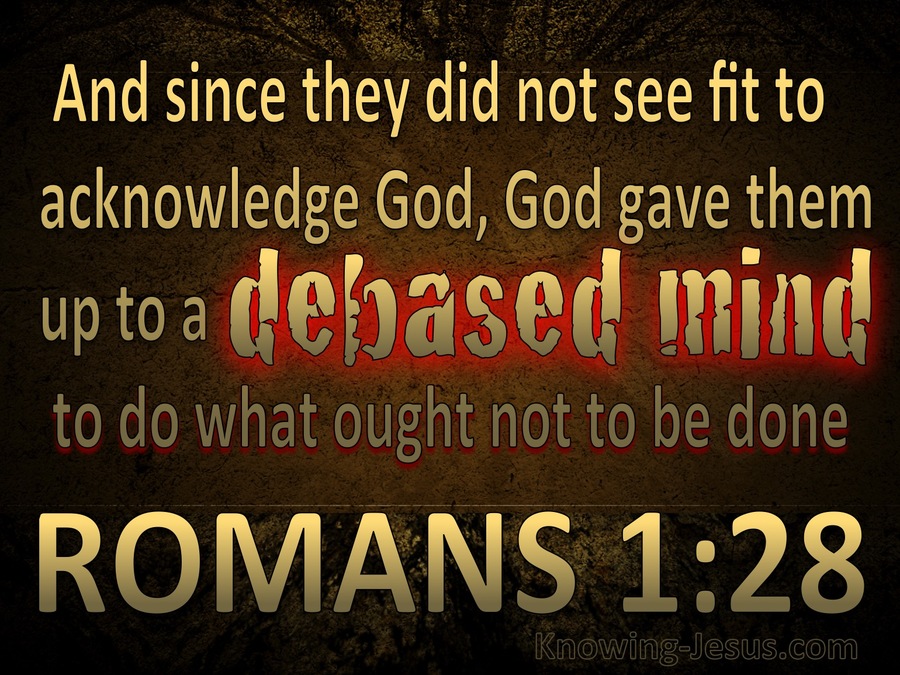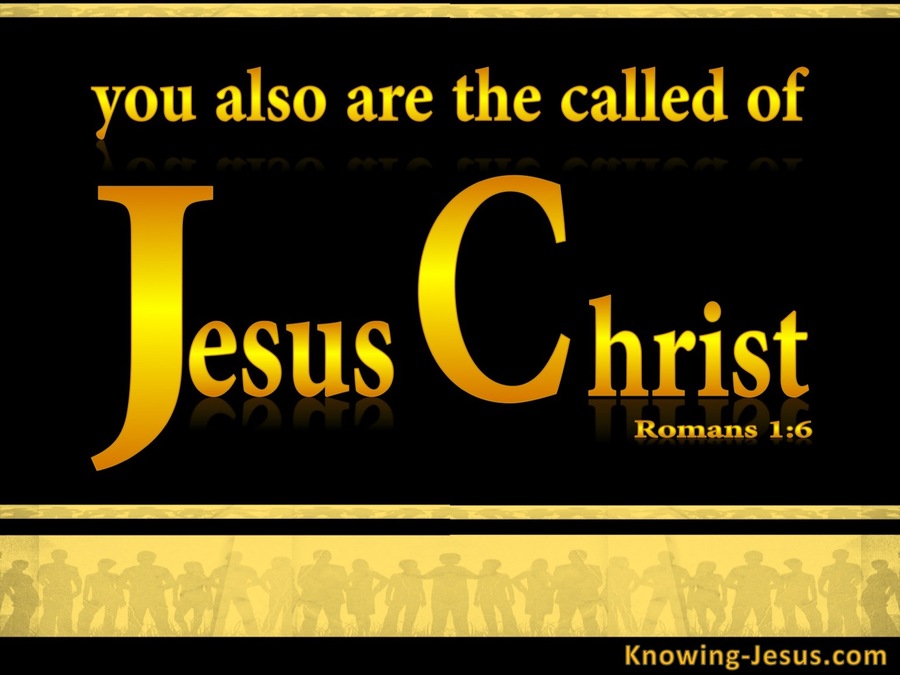
Ancient Rome

Romans 1 New King James Version (NKJV)
Greeting
1 Paul, a bondservant of Jesus Christ, called to be an apostle, separated to the gospel of God 2 which He promised before through His prophets in the Holy Scriptures, 3 concerning His Son Jesus Christ our Lord, who [a]was born of the seed of David according to the flesh, 4 and declared to be the Son of God with power according to the Spirit of holiness, by the resurrection from the dead. 5 Through Him we have received grace and apostleship for obedience to the faith among all nations for His name, 6 among whom you also are the called of Jesus Christ;
7 To all who are in Rome, beloved of God, called to be saints:
Grace to you and peace from God our Father and the Lord Jesus Christ.
Desire to Visit Rome
8 First, I thank my God through Jesus Christ for you all, that your faith is spoken of throughout the whole world. 9 For God is my witness, whom I serve [b]with my spirit in the gospel of His Son, that without ceasing I make mention of you always in my prayers, 10 making request if, by some means, now at last I may find a way in the will of God to come to you. 11 For I long to see you, that I may impart to you some spiritual gift, so that you may be established— 12 that is, that I may be encouraged together with you by the mutual faith both of you and me.
13 Now I do not want you to be unaware, brethren, that I often planned to come to you (but was hindered until now), that I might have some fruit among you also, just as among the other Gentiles. 14 I am a debtor both to Greeks and to barbarians, both to wise and to unwise. 15 So, as much as is in me, I am ready to preach the gospel to you who are in Rome also.
The Just Live by Faith
16 For I am not ashamed of the gospel [c]of Christ, for it is the power of God to salvation for everyone who believes, for the Jew first and also for the Greek. 17 For in it the righteousness of God is revealed from faith to faith; as it is written, “The just shall live by faith.”
God’s Wrath on Unrighteousness
18 For the wrath of God is revealed from heaven against all ungodliness and unrighteousness of men, who [d]suppress the truth in unrighteousness, 19 because what may be known of God is [e]manifest [f]in them, for God has shown it to them. 20 For since the creation of the world His invisible attributes are clearly seen, being understood by the things that are made, even His eternal power and [g]Godhead, so that they are without excuse, 21 because, although they knew God, they did not glorify Him as God, nor were thankful, but became futile in their thoughts, and their foolish hearts were darkened. 22 Professing to be wise, they became fools, 23 and changed the glory of the incorruptible God into an image made like [h]corruptible man—and birds and four-footed animals and creeping things.
24 Therefore God also gave them up to uncleanness, in the lusts of their hearts, to dishonor their bodies among themselves, 25 who exchanged the truth of God for the lie, and worshiped and served the creature rather than the Creator, who is blessed forever. Amen.
26 For this reason God gave them up to vile passions. For even their [i]women exchanged the natural use for what is against nature. 27 Likewise also the [j]men, leaving the natural use of the [k]woman, burned in their lust for one another, men with men committing what is shameful, and receiving in themselves the penalty of their error which was due.
28 And even as they did not like to retain God in their knowledge, God gave them over to a debased mind, to do those things which are not fitting; 29 being filled with all unrighteousness, [l]sexual immorality, wickedness, [m]covetousness, [n]maliciousness; full of envy, murder, strife, deceit, evil-mindedness; they are whisperers, 30 backbiters, haters of God, violent, proud, boasters, inventors of evil things, disobedient to parents, 31 [o]undiscerning, untrustworthy, unloving, [p]unforgiving, unmerciful; 32 who, knowing the righteous judgment of God, that those who practice such things are deserving of death, not only do the same but also approve of those who practice them.
Footnotes:
- Romans 1:3 came
- Romans 1:9 Or in
- Romans 1:16 NU omits of Christ
- Romans 1:18 hold down
- Romans 1:19 evident
- Romans 1:19 among
- Romans 1:20 divine nature, deity
- Romans 1:23 perishable
- Romans 1:26 Lit. females
- Romans 1:27 Lit. males
- Romans 1:27 Lit. female
- Romans 1:29 NU omits sexual immorality
- Romans 1:29 greed
- Romans 1:29 malice
- Romans 1:31 without understanding
- Romans 1:31 NU omits unforgiving
- Romans 1:3 came
- Romans 1:9 Or in
- Romans 1:16 NU omits of Christ
- Romans 1:18 hold down
- Romans 1:19 evident
- Romans 1:19 among
- Romans 1:20 divine nature, deity
- Romans 1:23 perishable
- Romans 1:26 Lit. females
- Romans 1:27 Lit. males
- Romans 1:27 Lit. female
- Romans 1:29 NU omits sexual immorality
- Romans 1:29 greed
- Romans 1:29 malice
- Romans 1:31 without understanding
- Romans 1:31 NU omits unforgiving
Other Footnotes
1) Romans 1
New American Bible (Revised Edition) (NABRE):
- 1:1–7 In Paul’s letters the greeting or praescriptio follows a standard form, though with variations. It is based upon the common Greco-Roman epistolary practice, but with the addition of Semitic and specifically Christian elements. The three basic components are: name of sender; name of addressee; greeting. In identifying himself, Paul often adds phrases to describe his apostolic mission; this element is more developed in Romans than in any other letter. Elsewhere he associates co-workers with himself in the greeting: Sosthenes (1 Corinthians), Timothy (2 Corinthians; Philippians; Philemon) Silvanus (1 Thessalonians—2 Thessalonians). The standard secular greeting was the infinitive chairein, “greetings.” Paul uses instead the similar-sounding charis, “grace,” together with the Semitic greeting šālôm (Greek eirēnē), “peace.” These gifts, foreshadowed in God’s dealings with Israel (see Nm 6:24–26), have been poured out abundantly in Christ, and Paul wishes them to his readers. In Romans the Pauline praescriptio is expanded and expressed in a formal tone; it emphasizes Paul’s office as apostle to the Gentiles. Rom 1:3–4 stress the gospel or kerygma, Rom 1:2 the fulfillment of God’s promise, and Rom 1:1, 5 Paul’s office. On his call, see Gal 1:15–16; 1 Cor 9:1; 15:8–10; Acts 9:1–22; 22:3–16; 26:4–18.
- 1:1 Slave of Christ Jesus: Paul applies the term slave to himself in order to express his undivided allegiance to the Lord of the church, the Master of all, including slaves and masters. “No one can serve (i.e., be a slave to) two masters,” said Jesus (Mt 6:24). It is this aspect of the slave-master relationship rather than its degrading implications that Paul emphasizes when he discusses Christian commitment.
- 1:3–4 Paul here cites an early confession that proclaims Jesus’ sonship as messianic descendant of David (cf. Mt 22:42; 2 Tm 2:8; Rev 22:16) and as Son of God by the resurrection. As “life-giving spirit” (1 Cor 15:45), Jesus Christ is able to communicate the Spirit to those who believe in him.
- 1:5 Paul recalls his apostolic office, implying that the Romans know something of his history. The obedience of faith: as Paul will show at length in chaps. 6–8 and 12–15, faith in God’s justifying action in Jesus Christ relates one to God’s gift of the new life that is made possible through the death and resurrection of Jesus Christ and the activity of the holy Spirit (see especially Rom 8:1–11).
- 1:7 Called to be holy: Paul often refers to Christians as “the holy ones” or “the saints.” The Israelite community was called a “holy assembly” because they had been separated for the worship and service of the Lord (see Lv 11:44; 23:1–44). The Christian community regarded its members as sanctified by baptism (Rom 6:22; 15:16; 1 Cor 6:11; Eph 5:26–27). Christians are called to holiness (1 Cor 1:2; 1 Thes 4:7), that is, they are called to make their lives conform to the gift they have already received.
- 1:8 In Greco-Roman letters, the greeting was customarily followed by a prayer. The Pauline letters usually include this element (except Galatians and 1 Timothy, 2 Timothy) expressed in Christian thanksgiving formulas and usually stating the principal theme of the letter. In 2 Corinthians the thanksgiving becomes a blessing, and in Ephesians it is preceded by a lengthy blessing. Sometimes the thanksgiving is blended into the body of the letter, especially in 1 Thessalonians. In Romans it is stated briefly.
- 1:10–12 Paul lays the groundwork for his more detailed statement in Rom 15:22–24 about his projected visit to Rome.
- 1:13 Brothers is idiomatic for all Paul’s “kin in Christ,” all those who believe in the gospel; it includes women as well as men (cf. Rom 4:3).
- 1:14 Greeks and non-Greeks: literally, “Greeks and barbarians.” As a result of Alexander’s conquests, Greek became the standard international language of the Mediterranean world. Greeks in Paul’s statement therefore means people who know Greek or who have been influenced by Greek culture. Non-Greeks were people whose cultures remained substantially unaffected by Greek influences. Greeks called such people “barbarians” (cf. Acts 28:2), meaning people whose speech was foreign. Roman citizens would scarcely classify themselves as such, and Nero, who was reigning when Paul wrote this letter, prided himself on his admiration for Greek culture. Under obligation: Paul will expand on the theme of obligation in Rom 13:8; 15:1, 27.
- 1:16–17 The principal theme of the letter is salvation through faith. I am not ashamed of the gospel: Paul is not ashamed to proclaim the gospel, despite the criticism that Jews and Gentiles leveled against the proclamation of the crucified savior; cf. 1 Cor 1:23–24. Paul affirms, however, that it is precisely through the crucifixion and resurrection of Jesus that God’s saving will and power become manifest. Jew first (cf. Rom 2:9–10) means that Jews especially, in view of the example of Abraham (Rom 4), ought to be the leaders in the response of faith.
- 1:17 In it is revealed the righteousness of God from faith to faith: the gospel centers in Jesus Christ, in whom God’s saving presence and righteousness in history have been made known. Faith is affirmation of the basic purpose and meaning of the Old Testament as proclamation of divine promise (Rom 1:2; 4:13) and exposure of the inability of humanity to effect its salvation even through covenant law. Faith is the gift of the holy Spirit and denotes acceptance of salvation as God’s righteousness, that is, God’s gift of a renewed relationship in forgiveness and power for a new life. Faith is response to God’s total claim on people and their destiny. The one who is righteous by faith will live: see note on Hb 2:4.
- 1:18–3:20 Paul aims to show that all humanity is in a desperate plight and requires God’s special intervention if it is to be saved.
- 1:18–32 In this passage Paul uses themes and rhetoric common in Jewish-Hellenistic mission proclamation (cf. Wis 13:1–14:31) to indict especially the non-Jewish world. The close association of idolatry and immorality is basic, but the generalization needs in all fairness to be balanced against the fact that non-Jewish Christian society on many levels displayed moral attitudes and performance whose quality would challenge much of contemporary Christian culture. Romans themselves expressed abhorrence over devotion accorded to animals in Egypt. Paul’s main point is that the wrath of God does not await the end of the world but goes into action at each present moment in humanity’s history when misdirected piety serves as a facade for self-interest.
- 1:18 The wrath of God: God’s reaction to human sinfulness, an Old Testament phrase that expresses the irreconcilable opposition between God and evil (see Is 9:11, 16, 18, 20; 10:4; 30:27). It is not contrary to God’s universal love for his creatures, but condemns Israel’s turning aside from the covenant obligations. Hosea depicts Yahweh as suffering intensely at the thought of having to punish Israel (Hos 11:8–9). God’s wrath was to be poured forth especially on the “Day of Yahweh” and thus took on an eschatological connotation (see Zep 1:15).
- 1:24 In order to expose the depth of humanity’s rebellion against the Creator, God handed them over to impurity through the lusts of their hearts. Instead of curbing people’s evil interests, God abandoned them to self-indulgence, thereby removing the facade of apparent conformity to the divine will. Subsequently Paul will show that the Mosaic law produces the same effect; cf. Rom 5:20; 7:13–24. The divine judgment expressed here is related to the theme of hardness of heart described in Rom 9:17–18.
2) Romans 1
New International Version(NIV):
https://www.biblegateway.com/passage/?search=Romans+1&version=NIV
Footnotes:
- Romans 1:3 Or who according to the flesh
- Romans 1:4 Or was declared with power to be the Son of God
- Romans 1:5 Or that is
- Romans 1:13 The Greek word for brothers and sisters (adelphoi) refers here to believers, both men and women, as part of God’s family; also in 7:1, 4; 8:12, 29; 10:1; 11:25; 12:1; 15:14, 30; 16:14, 17.
- Romans 1:17 Or is from faith to faith
- Romans 1:17 Hab. 2:4
Outline of Romans (*)
1. The Power of the Good News, 16-17
a. God's righteousness is revealed
God's Righteousness is Revealed
The Gospel of Christ

Faith
Habakkuk 2:4 “Behold the proud, His soul is not upright in him; but the just shall live by his faith. [NKJV]
Romans 1:16 For I am not ashamed of the gospel of
Christ, for it is the power of God to salvation for everyone who
believes, for the Jew first and also for the Greek. 17 For in
it the righteousness of God is revealed from faith to faith; as it is
written, “The just shall live by faith.” [NKJV]
II. Rigteousness Needed: Condemnation, Sin, 1:18-3:20
A.
From Idolatry to Depravity - The Condemnation of the Gentile  God’s Wrath on
Unrighteousness (Gentiles are without
excuse), 1:18-32
God’s Wrath on
Unrighteousness (Gentiles are without
excuse), 1:18-32
1.
The Cause of the Condemnation  Willful ignorance - (Wicked Man Dishonoring God), 1:18-23
Willful ignorance - (Wicked Man Dishonoring God), 1:18-23
a. Wicked man stifling God's revealed truth (18-19)



b. Wicked man despising the testimony of nature (20)



c. Wicked man ungrateful and foolish (21-22)

d. Wicked man given to idolatry (23)
The Condemnation of the Human
God reveals Himself in His Creation

Romans 1:18 For
the wrath of God is revealed from heaven against all ungodliness
and unrighteousness of men, who suppress the truth in
unrighteousness, 19 because what may be known of God is manifest in
them, for God has shown it to them. 20 For since the creation of the
world His invisible attributes are
clearly seen, being understood by the things that are made, even His
eternal power and God head, so that they are without excuse,
How Has God Revealed Himself
through
Nature?

2.
The Consequence of the Condemnation  Divine abandonment – (Holy God “Giving Up” on Wicked Man), 1:24-32
Divine abandonment – (Holy God “Giving Up” on Wicked Man), 1:24-32






a. Giving them up to disgusting uncleanness (24-25)


b. Giving them up to lesbianism and homosexuality (26-27)
c. Giving them up to debased minds and all unrighteousness
(28-32)



B. God’s Just Judgment: The Condemnation of the Moralist, 2:1-16
1. God’s Just Judgment, 1-11
2. Judgment by the Interior Law, 12-16
C. God’s Righteous Judgment  The Condemnation of the Jew, 2:17-3:8
The Condemnation of the Jew, 2:17-3:8
1. God’s Righteous Judgment (Judgment by the Mosaic Law): He did not keep the law of God, 2:17-29
a. The Jews guilty as the Gentiles, 17-24
b. Circumcision of No Avail, 25-29
(…)
(*) The
RYRIE Study Bible – New International Version, New King James Version – (NKJV),
Holman Christian Standard Bible – (HSCB), Common English Bible - (CEB), Contemporary English Version - CEV, King James Version – (KJV), New Living Translation - (NLT), and Outline by
Mark A. Copeland http://www.ccel.org/contrib/exec_outlines/ro/ro_01.htm

Living
By Faith
COMFORT
IN TRIALS
Walk
by Faith - Have Faith in God /
Sermon
& Hymn "Living by Faith"





1 Corinthians 6:9 Do you not know that the unrighteous will not inherit the kingdom of God? Do not be deceived. Neither fornicators, nor idolaters, nor adulterers, nor homosexuals, nor sodomites, 10 nor thieves, nor covetous, nor drunkards, nor revilers, nor extortioners will inherit the kingdom of God. 11 And such were some of you. But you were washed, but you were sanctified, but you were justified in the name of the Lord Jesus and by the Spirit of our God. [NKJV]
Ephesians 5:8 For
you were once darkness, but now you
are light in the Lord. Walk as children of light 9 (for the fruit of
the Spirit is in all
goodness, righteousness, and truth), [NKJV]














































































Nenhum comentário:
Postar um comentário